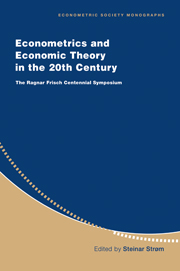Book contents
- Frontmatter
- PART I RAGNAR FRISCH AND HIS CONTRIBUTIONS TO ECONOMICS
- PART II UTILITY MEASUREMENT
- PART III PRODUCTION THEORY
- PART IV MICROECONOMIC POLICY
- 8 Evaluating the Welfare State
- 9 Frisch, Hotelling, and the Marginal-Cost Pricing Controversy
- PART V ECONOMETRIC METHODS
- PART VI MACRODYNAMICS
- PART VII MACROECONOMIC PLANNING
- Author Index
- Subject Index
9 - Frisch, Hotelling, and the Marginal-Cost Pricing Controversy
from PART IV - MICROECONOMIC POLICY
Published online by Cambridge University Press: 05 January 2013
- Frontmatter
- PART I RAGNAR FRISCH AND HIS CONTRIBUTIONS TO ECONOMICS
- PART II UTILITY MEASUREMENT
- PART III PRODUCTION THEORY
- PART IV MICROECONOMIC POLICY
- 8 Evaluating the Welfare State
- 9 Frisch, Hotelling, and the Marginal-Cost Pricing Controversy
- PART V ECONOMETRIC METHODS
- PART VI MACRODYNAMICS
- PART VII MACROECONOMIC PLANNING
- Author Index
- Subject Index
Summary
Le meilleur de tous les tarifs serait celui qui ferait payer a ceux qui passent sur une voie de communication un peage proportionnel a l'utilite qu'ils retirent du passage . . .
II est evident que l'effet d'un tel tarif serait: d'abord de laisser passer autant de monde que si le passage etait gratuit; ainsi point d'utilite perdue pour la societe; ensuite de donner une recette toujours suffisante pour qu'un travail utile put se faire.
Je n'ai pas besoin de dire que je ne crois pas a la possibilite d'application de ce tarif volontaire; il rencontrerait un obstacle insurmontable dans l'improbite universelle des passants, mais c'est la le type dont il faut chercher a s'approcher par un tarif obligatoire.
Jules Dupuit (1849, p. 223)Introduction
In an elegant Econometrica paper, Hotelling (1938) provided the appropriate formulas to assess the social costs of marginal departures from marginal-cost pricing when the interrelations between commodities are taken into account. In so doing he generalized the work of Dupuit (1844) and Marshall (1890). But he went further.
This proposition has revolutionary implications, for example in electric power and railway economics, in showing that society would do well to cut rates drastically and replace the revenue thus lost by subsidies derived largely from income and inheritance taxes and the site value of land.
[Hotelling, 1939, p. 151]- Type
- Chapter
- Information
- Econometrics and Economic Theory in the 20th CenturyThe Ragnar Frisch Centennial Symposium, pp. 319 - 342Publisher: Cambridge University PressPrint publication year: 1999
- 1
- Cited by



